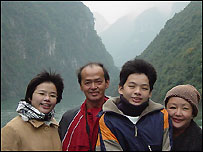
Many Chinese Malaysians visit China to find their roots
|
The Chinese have helped shape the history of the Malay peninsula for more than 600 years. In the early 15th Century, Malacca paid tribute to Thailand. But all that changed when the Chinese emperor gave the port his protection in 1409.
"After that Hsien Lo [the Thai ruler] did not dare invade," wrote contemporary diarist Ma Huan.
Thus 1409 is the date to which some trace the origins of the first independent Malay kingdom on the peninsula.
Its ruler, Paramaswara, is said to have travelled to China and married one of the emperor's daughters before returning to Malacca with his wife┐s retinue of more than two hundred retainers.
They founded the first recorded Chinese community in the peninsula, and their descendants, known as Babanonya or Peranakan (Straits-born), intermarried with the locals, spoke Malay and have been in Malaysia ever since.
Immigration during the colonial period was such that by the time the country won its independence in 1957, the ethnic Chinese made up almost half the population on the peninsula.
But bloody racial clashes between Malaysian Chinese and Malays in 1969 changed the political landscape.
 |
 As an overseas Chinese person, I find that my perspective, values and taste are more westernised than a mainlander's As an overseas Chinese person, I find that my perspective, values and taste are more westernised than a mainlander's 
|
"From then on the [Malaysian] Chinese influence in this country has been decreasing - especially political influences," said Jadryn Loo, a young political activist. Instead the energies of the community, which now accounts for more than a quarter of Malaysia's population, have gone into defending its identity.
"From 1969 onwards the Chinese actually fought to preserve their culture, heritage and... education," said Jadryn Loo.
The 1998 anti-Chinese riots in Indonesia reinforced the sense of insecurity.
But an emergent China could change all that, particularly if Malaysia's Chinese community can act as a bridge to the new big boy on the block.
"We will feel much safer, and in fact we will feel much [more] important when China emerges as a superpower," said Jadryn Loo.
Cultural traditions
Most visitors to Malaysia are struck by how successfully the country's Chinese population has preserved its identity - in contrast to Thailand, for instance, which has operated a policy of assimilation.
"We're like a little backwater of Chinese culture as it was in China 80 years ago," said heritage architect Jimmy Lim.
"A lot of the Chinese festivities celebrated here, the Chinese no longer do that sort of thing. For instance Penang has a very large Chinese community - descendants of peasants - and they're still celebrating the rites and rituals that the peasants used to," he said.
But while some Chinese Malaysians see themselves as "more Chinese than the Chinese", others like graphic designer Joe Lam see themselves as "global Malaysians" - drawing on the country's mix of Malay, Indian, European and Chinese influences.
"As an overseas Chinese person, I find that my perspective, values and taste are more Westernised than a mainlander's," he said.
But even those who champion Chinese traditions do not necessarily identify themselves with the country.
"Especially [for the] younger generation, which was born after independence in 1957, we no longer see China as the motherland," said Jadryn Loo.
"In those days, especially my father's or grandfather's generation, they would have preferred to have died in China rather than having themselves buried in Malaysia."
Relations with the motherland
For many Chinese Malaysians, China is a curiosity in the same way that Europe offers many Americans a chance to find their roots.
"We go to China on holidays and see where our ancestors come from," said businessman Banie Chin.
"I've been to my village - to see my grandfather's grave in Jiangxi. My grandfather died fighting with Mao, and my father then came here from China when he was very young.
"But I'm Malaysian," he added.
 |
CHINA'S DIASPORA
First major emigration in 14th-16thC by traders and seafarers
Colonial powers used Chinese as labourers in SE Asia and the Americas
But also have reputation for business success
There are about 30m overseas Chinese in total
Indonesia and Thailand have the biggest numbers - 7-9m each (estimates)
Singapore has the highest concentration - 3m, or 75% of its population
|
Jimmy Lim takes much the same view. "[China's] got no relevance to me unless I'm doing business over there," he said.
And he is dismissive of the notion that overseas Chinese businessmen can use their cultural knowledge and their ethnicity to their advantage when dealing with mainlanders.
"You speak to everyone who's been to China," he said. "They went over there saying 'tong pao' [same womb] - in other words 'we are like family'. It didn't mean anything. They still got their fingers burned."
Some Malaysian Chinese have come to see China as a competitor rather than as an opportunity.
For instance, they worry that substandard Chinese goods which cannot be sold elsewhere are dumped onto the South East Asian market, including Malaysia.
However analyst Dr Steven Wong believes that Malaysia's future lies to some extent in riding on China's coat-tails.
"If we're to continue to penetrate world markets, our companies will have to be integrated with Chinese economic system," he said.
And though he admits it is "the threats that are much more apparent and visible today", he is sanguine about the prospects in the future.
"What we have experienced so far in terms of our engagement with China is hardly scratching the surface. Opportunities will come but they'll be hard won."
This is the second in a series of articles about the Chinese diaspora. The first article appeared here:

